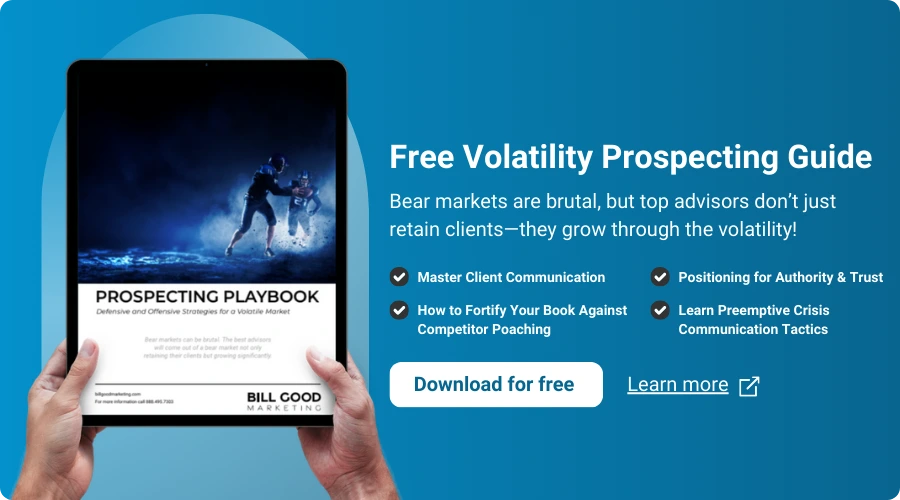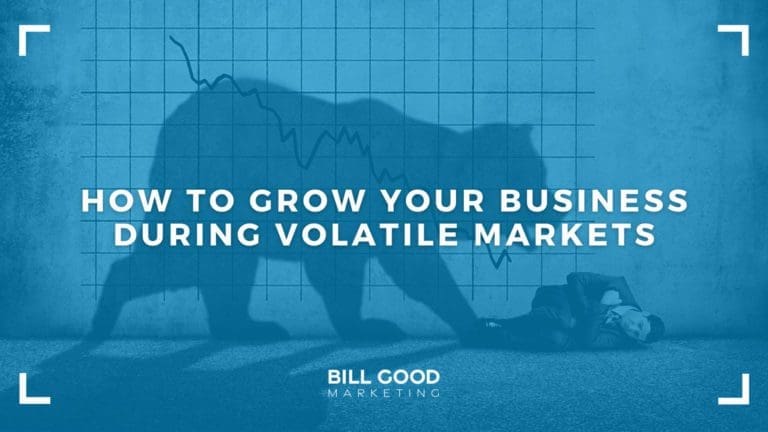As I am sure you are already aware, 2025 is going to be an interesting year! Volatile markets are something you (and every other financial advisor) will have to deal with. We know how to navigate these kinds of markets. We’ve helped our clients not just survive during these times, but also thrive through multiple bear markets and dozens of market corrections.
- The 1987 stock market crash.
- The bursting of the dot-com bubble.
- The aftermath of 9/11.
- The Great Recession of 2008.
- The Debt Crisis of 2012.
- The Trade War of 2018.
- The Pandemic Bear of 2020.
And I am sure you know financial advisors in your circle who always seem to keep growing, no matter what sort of shape the markets are in. You may even be one in the face of this volatility. The reason behind this growth is simple. It is…

They followed the “Law of Handholding”
The Law of Handholding is very simple. It states:
“When bad or unsettling news happens, clients and prospects need to be told what to think…and quickly.“
Otherwise, both will become someone else’s clients.
You see, while market volatility might be unpleasant for investors, it can be a godsend for you. Don’t believe me? Then check out what History has to say.
Come back with me to autumn of 2001. The nation – indeed, the world – was still coming to grips with the 9/11 terrorist attacks. This was especially true of financial advisors, as noted by a writer named Thomas Kostigan.
On November 20th, he published an article in CBS Market Watch titled, “Financial advisors ran, hid on September 11.” Among other things, Kostigan found that less than one in five advisors called their clients during the period right after September 11. I can believe that. When the markets tumble, no one wants to talk to an angry or worried client.
As a result of not communicating, as many as one third of all the clients who were not contacted by their financial advisor looked for someone else.
Kostigan found the same phenomenon occurred after the stock market crash in October of ’97. Back then, only 18.3% of financial advisors called their clients. Once again, many of the clients they didn’t contact got fed up and started looking for someone else to help them reach their financial goals.
I imagine that if Kostigan were to update his article, he would find similar data in 2012… and again in 2018… and for that matter, early 2020. And probably today.
Now, the immediate conclusion is obvious. During times of market volatility, like right now, it’s crucial that you reach out to your clients. Otherwise, you may lose business.
But now look at it from another angle. According to Kostigan, as many as one third of all uncontacted clients looked to switch to another financial advisor after 9/11.
That’s tens of thousands of investors. Frustrated. Unhappy. Looking.
Those are your prospects.

What Clients and Prospects Want from their Financial Advisor During Volatile Markets
Take a moment to imagine a hypothetical prospect whom we’ll call Velda. She just heard that the Dow dropped 1,000 points in less than a day. She waits for her advisor to call to explain what’s going on and what she should do. The phone never rings.
So she calls his office. He’s unavailable.
Is she frustrated? You bet.
The next day, she gets a handholding letter from you explaining exactly what’s going on and why. A day or two after that, she gets a call from your office, asking if she has any questions, or if there’s anything you can do for her.
Is she impressed? You bet.
Before you know it, suddenly Velda starts thinking of you whenever she’s in need of financial advice.
To put it simply, you can use market volatility to your advantage by simply being out there, proactively contacting, educating, and reassuring your clients and prospects that someone is watching out for them, and that they have options.
It’s how you get clients to stay with you even when their quarterly statements might not look so good.
It’s how you get clients to trust you with even more of their assets.
It’s how you get clients to refer friends and family.
And it’s how you get prospects to start thinking, “Why should I stick with my guy when this other advisor is already doing so much more for me?”
I would like to take a moment right now and direct your attention to your current handholding strategy. Are you doing enough handholding to ensure that your prospects think of you first?
To help you start reaping all these rewards, here are:

The 9 Steps to Effective Handholding During Volatile Markets
1. Call each of your clients…
For example, consider putting on a client education event centered on the current market volatility, and encourage your clients to bring friends. Or, do a full-blown prospecting seminar on the same topic.
2. Send out a handholding letter to each of your clients as soon as possible.
A good handholding letter should not only recap what’s going on in the markets, but explain (The more education you provide, the more your clients see you as a true expert in your field.)
NOTE: You can certainly send a handholding email, but it is STRONGLY recommended that you also send a physical letter. Our research has proven that letters get read, kept, and shared far more than emails.
3. Once your clients are taken care of, send the same handholding letter to your prospects.
Not only will they appreciate the gesture, they will get a glimpse into how you treat your clients…as opposed to how their current advisor treats them.
4. Call as many of your prospects as possible
Encourage them to ask questions. Invite them to come in for a second opinion of their portfolio and risk tolerance.
5. Send a short email to all your clients
Ask this very simple question: “Do you have any friends or family who would like to receive the letter I sent you?” (This is a great way to get referrals.)
6. Do some event marketing
For example, consider putting on a client education event centered on the current market volatility, and encourage your clients to bring friends. Or, do a full-blown prospecting seminar on the same topic.
7. Give conference calls a try
Some of my clients use these with great success. Every week or so, host a CC centered on a different aspect of the market volatility, or a particular investment affected by the volatility. Invite your clients, strategic partners, and existing prospects to attend, and encourage them to spread the word. Compared to seminars, these are much easier and less expensive to put on.
8. Offer to be an “emergency speaker”
Contact different organizations, clubs, or other groups in your area whose members you want to know. Offer to come speak on the current volatility.
9. Start cold calling!
Contact different organizations, clubs, or other groups in your area whose members you want to know. Offer to come speak on the current volatility.
Sales is a numbers game, and there’s no better way to reach a large number of people quickly than through cold calling.

So there you have it…
Nine ways to grow your business by using the current market volatility to your advantage.
But whatever you do, remember: there are thousands of investors out there who aren’t hearing from their advisors during volatile markets. That means they are looking for a change.
Don’t you want to be the first advisor they see?
Time to get handholding.
Good luck!




